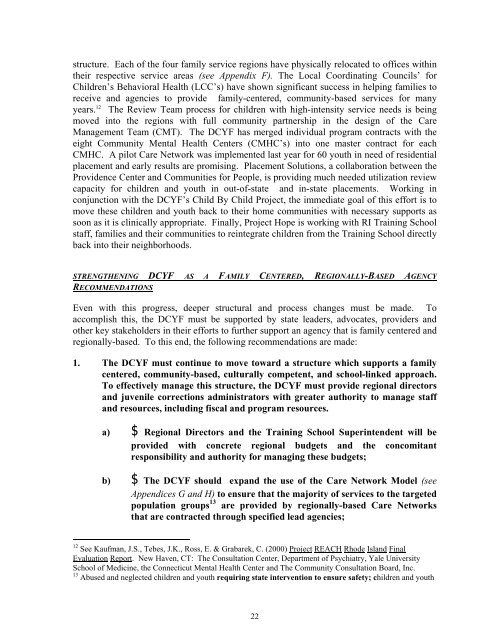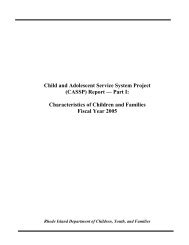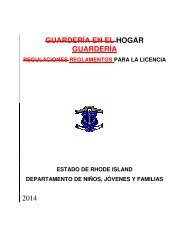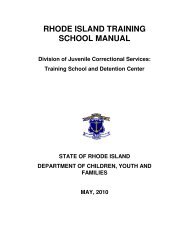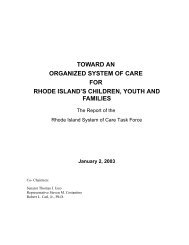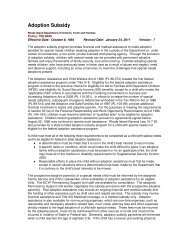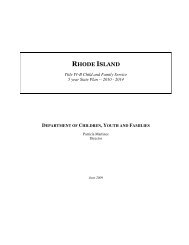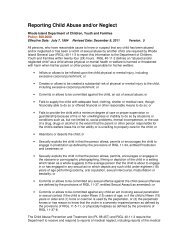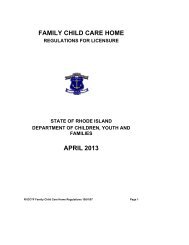system of care for rhode island's children, youth and families
system of care for rhode island's children, youth and families
system of care for rhode island's children, youth and families
Create successful ePaper yourself
Turn your PDF publications into a flip-book with our unique Google optimized e-Paper software.
structure. Each <strong>of</strong> the four family service regions have physically relocated to <strong>of</strong>fices within<br />
their respective service areas (see Appendix F). The Local Coordinating Councils’ <strong>for</strong><br />
Children’s Behavioral Health (LCC’s) have shown significant success in helping <strong>families</strong> to<br />
receive <strong>and</strong> agencies to provide family-centered, community-based services <strong>for</strong> many<br />
years. 12 The Review Team process <strong>for</strong> <strong>children</strong> with high-intensity service needs is being<br />
moved into the regions with full community partnership in the design <strong>of</strong> the Care<br />
Management Team (CMT). The DCYF has merged individual program contracts with the<br />
eight Community Mental Health Centers (CMHC’s) into one master contract <strong>for</strong> each<br />
CMHC. A pilot Care Network was implemented last year <strong>for</strong> 60 <strong>youth</strong> in need <strong>of</strong> residential<br />
placement <strong>and</strong> early results are promising. Placement Solutions, a collaboration between the<br />
Providence Center <strong>and</strong> Communities <strong>for</strong> People, is providing much needed utilization review<br />
capacity <strong>for</strong> <strong>children</strong> <strong>and</strong> <strong>youth</strong> in out-<strong>of</strong>-state <strong>and</strong> in-state placements. Working in<br />
conjunction with the DCYF’s Child By Child Project, the immediate goal <strong>of</strong> this ef<strong>for</strong>t is to<br />
move these <strong>children</strong> <strong>and</strong> <strong>youth</strong> back to their home communities with necessary supports as<br />
soon as it is clinically appropriate. Finally, Project Hope is working with RI Training School<br />
staff, <strong>families</strong> <strong>and</strong> their communities to reintegrate <strong>children</strong> from the Training School directly<br />
back into their neighborhoods.<br />
STRENGTHENING DCYF AS A FAMILY CENTERED, REGIONALLY-BASED AGENCY<br />
RECOMMENDATIONS<br />
Even with this progress, deeper structural <strong>and</strong> process changes must be made. To<br />
accomplish this, the DCYF must be supported by state leaders, advocates, providers <strong>and</strong><br />
other key stakeholders in their ef<strong>for</strong>ts to further support an agency that is family centered <strong>and</strong><br />
regionally-based. To this end, the following recommendations are made:<br />
1. The DCYF must continue to move toward a structure which supports a family<br />
centered, community-based, culturally competent, <strong>and</strong> school-linked approach.<br />
To effectively manage this structure, the DCYF must provide regional directors<br />
<strong>and</strong> juvenile corrections administrators with greater authority to manage staff<br />
<strong>and</strong> resources, including fiscal <strong>and</strong> program resources.<br />
a) $ Regional Directors <strong>and</strong> the Training School Superintendent will be<br />
provided with concrete regional budgets <strong>and</strong> the concomitant<br />
responsibility <strong>and</strong> authority <strong>for</strong> managing these budgets;<br />
b) $ The DCYF should exp<strong>and</strong> the use <strong>of</strong> the Care Network Model (see<br />
Appendices G <strong>and</strong> H) to ensure that the majority <strong>of</strong> services to the targeted<br />
population groups 13 are provided by regionally-based Care Networks<br />
that are contracted through specified lead agencies;<br />
12 See Kaufman, J.S., Tebes, J.K., Ross, E. & Grabarek, C. (2000) Project REACH Rhode Isl<strong>and</strong> Final<br />
Evaluation Report. New Haven, CT: The Consultation Center, Department <strong>of</strong> Psychiatry, Yale University<br />
School <strong>of</strong> Medicine, the Connecticut Mental Health Center <strong>and</strong> The Community Consultation Board, Inc.<br />
13 Abused <strong>and</strong> neglected <strong>children</strong> <strong>and</strong> <strong>youth</strong> requiring state intervention to ensure safety; <strong>children</strong> <strong>and</strong> <strong>youth</strong><br />
22


